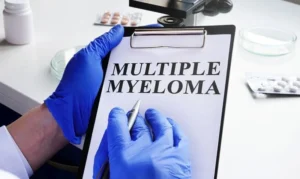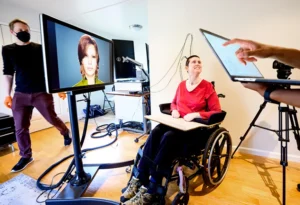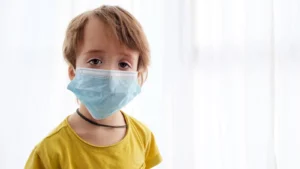After a recent data leak revealed a dramatic benefit for Johnson & Johnson and Legend Biotech’s Carvykti in earlier treatment of multiple myeloma, the pair has peeled back some even more stunning efficacy results that could further pressure Bristol Myers Squibb’s rival CAR-T therapy, Abecma.
In a small group of heavily pretreated patients with multiple myeloma that was refractory to three classes of therapies, Carvykti reduced the risk of cancer progression or death by 85% compared with physician’s choice of standard combo treatment, Legend Biotech CEO Ying Huang, Ph.D., told Fierce Pharma in an interview.
The result was drawn from a subgroup analysis of the phase 3 CARTITUDE-4 trial, which will be presented at the 2023 American Society of Clinical Oncology annual meeting in Chicago.
Carvykti’s 85% improvement appeared better than the 54% that Abecma posted for a similar triple class-refractory patient group in a separate phase 3 trial coded KarMMA-3. These patients’ cancers were resistant to at least one each of an immunomodulatory agent such as BMS’ Revlimid, a proteasome inhibitor such as Takeda’s Velcade, and an anti-CD38 antibody such as J&J’s Darzalex.
But it’s worth noting that the Carvykti data came from 63 patients who got either the BCMA-targeted CAR-T or standard treatment in the CARTITUDE-4 study, whereas the Abecma number was derived from 253 patients in KarMMa-3.
In the entire KarMMA-3 trial, which enrolled patients who had tried two to four prior lines of therapy, Abecma mounted a progression-free survival (PFS) benefit of 51% against standard of care. The CARTITUDE-4 trial recruited patients after one to three prior lines of treatment and showed that Carvykti reduced the risk of progression or death by 74%.
One might think that Carvykti’s data looked better because it represents one line earlier than Abecma’s. But just as how Carvykti performed better in the triple-refractory subgroup than in the overall trial population, Carvykti takers who tried two or three prior lines of therapy actually saw a bigger, 76% risk reduction. Among those who just underwent one prior line, Carvykti cut the progression risk by 65%.
“That means [Carvykti] is very consistent in [its] efficacy; however, standard of care tends to be less efficacious in the heavily pretreated patients—that’s our interpretation,” Ying said.
The CARTITUDE-4 win paves the way for Carvykti to move from fifth-line treatment of multiple myeloma to the second line. But to achieve J&J and Legend’s aggressive $5 billion peak sales estimate, Carvykti still needs to make a mark in newly diagnosed patients.
After reviewing a leaked abstract of the CARTITUDE-4 data, analysts at SVB Securities wondered whether Carvykti has already reached an efficacy ceiling in the second line. Ying said that isn’t the case.
In CARTITUDE-4, Carvykti registered a tumor response rate of 85%, including 73% complete responses. That was lower than the 98% overall response rate and 83% complete response rate seen in the CARTITUDE-1 trial in a late-line setting.
Carvykti takers went a median 34.9 months without progression in CARTITUDE-1, according to data shared at ASCO 2023. The median PFS in CARTITUDE-4 wasn’t reached at this point. But accounting for a statistical margin of error, the drug’s PFS performance at the lower boundary was slightly worse in the new trial than in the late-line study, which makes one speculate that CARTITUDE-4’s median PFS eventually might not be too different from CARTITUDE-1’s.
Reaching an efficacy ceiling would be a problem for Carvykti’s prospect because the PFS bar in front-line myeloma is much higher, the SVB team pointed out in an April note. In the phase 3 MAIA trial, J&J’s Darzalex, used in tandem with Revlimid and dexamethasone, posted a median PFS of 61.9 months in newly diagnosed, transplant-ineligible myeloma patients.
Those two data points formed the basis of SVB’s concern. But both SVB and Ying noted that the CARTITUDE-4 analysis included some patients who were assigned to received Carvykti but eventually didn’t receive the drug because of rapid progression of disease. In contrast, all patients in CARTITUDE-1 got Carvykti per trial protocol.
Excluding 32 patients (15%) in the Carvykti arm that didn’t receive the CAR-T as required, Carvykti’s response rate reached 99.4%, including 86.4% of patients who achieved a complete response. Counting only the as-treated patients, Carvykti’s 12-month PFS rate was also higher in CARTITUDE-4 than in CARTITUDE-1, Ying noted.
J&J and Legend have already launched their front-line bid. The phase 3 CARTITUDE-5 trial is testing Carvykti’s use following a combination of Velcade, Revlimid and dexamethasone (VRd) in newly diagnosed multiple myeloma not intended for transplant. The comparator is continuous VRd treatment.
Ying declined to comment on whether he thinks Carvykti could eventually come above Darzalex’s 61.9-month median PFS, saying he would rather wait for the CARTITUDE-5 readout.
For now, J&J and Legend expect to file Carvykti as a second-line treatment with the FDA soon, Ying said. Besides the treatment line, the pair also plans to ask the FDA to expand Carvykti’s manufacturing specification, he said. Doing so would help increase Carvykti’s production success rate.
While whether Carvykti has reached an efficacy ceiling remains an open question, a manufacturing bottleneck is very much real for the personalized cell therapy as J&J and Legend struggle to meet demand. After a stagnation at the end of 2022, Carvykti’s sales reached $72 million in the first quarter, up from $55 million in the last three months of 2022.
Ying said people should expect a steady increase in Carvykti’s sales as a reflection of improved manufacturing capacity moving forward. The goal is to have 10,000 doses of annual capacity by the end of 2025. J&J and Legend have recently tapped Novartis to help make Carvykti for clinical trials, but it will take some time before Novartis could contribute because of a complex tech transfer process.
Originally posted in Fierce Pharma.



